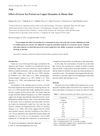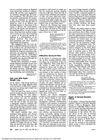Hibiscus leaves and apple skin could be effective in hair tonics to prevent hair loss.
 February 2021 in “Endocrinology, diabetes & metabolism case reports”
February 2021 in “Endocrinology, diabetes & metabolism case reports” A postmenopausal woman's excessive hair growth and hair loss were due to a non-cancerous ovarian condition, treated successfully with surgery.
 January 2021 in “Figshare”
January 2021 in “Figshare” Melatonin helps Cashmere goat hair follicles grow by affecting stem cell signals and the surrounding microenvironment.
 January 2021 in “Case Reports”
January 2021 in “Case Reports” A 71-year-old woman developed male-like features due to high testosterone levels caused by a benign ovarian tumor, which was successfully removed by surgery.
October 2020 in “The American journal of gastroenterology” Para-aminobenzoic acid in hair supplements can cause autoimmune hepatitis.

A man with a rare lung-focused form of hypereosinophilic syndrome improved with steroid treatment.
May 2019 in “Clinica chimica acta” The study developed methods to measure biomarkers in mice and found differences in hormone levels linked to gut microbiota diversity and stress response.
 August 2018 in “Current opinion in gynecology and obstetrics”
August 2018 in “Current opinion in gynecology and obstetrics” Gynecologists should learn about transgender care to provide the best service.
January 2018 in “Figshare” Melatonin helps Cashmere goats grow more hair by affecting genes and cell signals important for hair and blood vessel development.
January 2018 in “Figshare” Melatonin helps Cashmere goat hair follicles grow by affecting genes and cell signals important for their development and environment.
December 2014 in “대한미용학회지” 3% peppermint oil promotes hair growth and has strong antibacterial properties.
 January 2013 in “Food science and technology research”
January 2013 in “Food science and technology research” Green tea extract may increase copper levels in mouse hair without affecting liver copper.
 March 2010 in “Cosmetic Dermatology”
March 2010 in “Cosmetic Dermatology” Hair straightening methods have advanced to improve effectiveness and reduce damage, but still rely on heat and chemicals.
January 2007 in “Annals of The Royal College of Surgeons of England” Removing a hormone-producing adrenal tumor can stop hair loss in women with high testosterone levels.
January 2003 in “Journal of Clinical Dermatology” Cyclosporin promotes hair growth by boosting cell growth and reducing cell death.

Eating more protein during weight loss can prevent hair loss caused by not having enough protein.
 310 citations,
November 2011 in “Environment International”
310 citations,
November 2011 in “Environment International” Anticancer drugs are increasingly found in surface waters, and their long-term environmental effects are not well understood, requiring better testing methods.
 193 citations,
February 2015 in “Nature Communications”
193 citations,
February 2015 in “Nature Communications” Fungi-produced compounds can change plant root growth.
 177 citations,
December 2002 in “The Lancet”
177 citations,
December 2002 in “The Lancet” Fibrinogen/LDL apheresis may improve speech perception in sudden hearing loss, especially for those with high fibrinogen and LDL levels.
 139 citations,
February 2014 in “Journal of Advanced Research”
139 citations,
February 2014 in “Journal of Advanced Research” Vitamin D is important for skin health and may affect conditions like psoriasis and hair loss, but more research is needed to understand its role fully.
 135 citations,
August 1994 in “Clinical Endocrinology”
135 citations,
August 1994 in “Clinical Endocrinology” Most women with hirsutism or androgenic alopecia had polycystic ovaries, especially if they had irregular periods.
 131 citations,
October 2004 in “Clinical Cancer Research”
131 citations,
October 2004 in “Clinical Cancer Research” Tempol is safe and may prevent hair loss from brain radiotherapy.
87 citations,
January 1996 in “Journal of cellular biochemistry” Over 30 potential cancer prevention treatments are being tested, with some showing promise in early research.
 78 citations,
December 2011 in “Clinical toxicology”
78 citations,
December 2011 in “Clinical toxicology” Excessive selenium from a supplement caused toxicity but patients recovered with care.
 66 citations,
November 2001 in “European journal of endocrinology”
66 citations,
November 2001 in “European journal of endocrinology” Low SHBG and high FAI, FT, and DHEAS levels are effective in identifying PCOS.
 58 citations,
January 2006 in “Skin Pharmacology and Physiology”
58 citations,
January 2006 in “Skin Pharmacology and Physiology” High levels of testosterone and 5α-DHT can lead to cell death in cells important for hair growth.
 57 citations,
October 2021 in “Journal of ethnopharmacology”
57 citations,
October 2021 in “Journal of ethnopharmacology” Indian herbal medicine shows promise for treating skin diseases but needs more research to prove effectiveness.
50 citations,
December 2000 in “Journal of Pharmaceutical Sciences” Hair follicles significantly enhance electroosmotic transport during iontophoresis.
 42 citations,
December 2015 in “International Journal of Clinical Pharmacology and Therapeutics”
42 citations,
December 2015 in “International Journal of Clinical Pharmacology and Therapeutics” The 0.25% finasteride solution, when applied once a day, effectively reduces scalp DHT, potentially minimizing sexual side-effects linked to a systemic DHT reduction.
 42 citations,
January 2009 in “Colloids and Surfaces B: Biointerfaces”
42 citations,
January 2009 in “Colloids and Surfaces B: Biointerfaces” A certain surfactant sticks to human hair, making it change from water-repelling to water-attracting, which could help in hair conditioning.



















